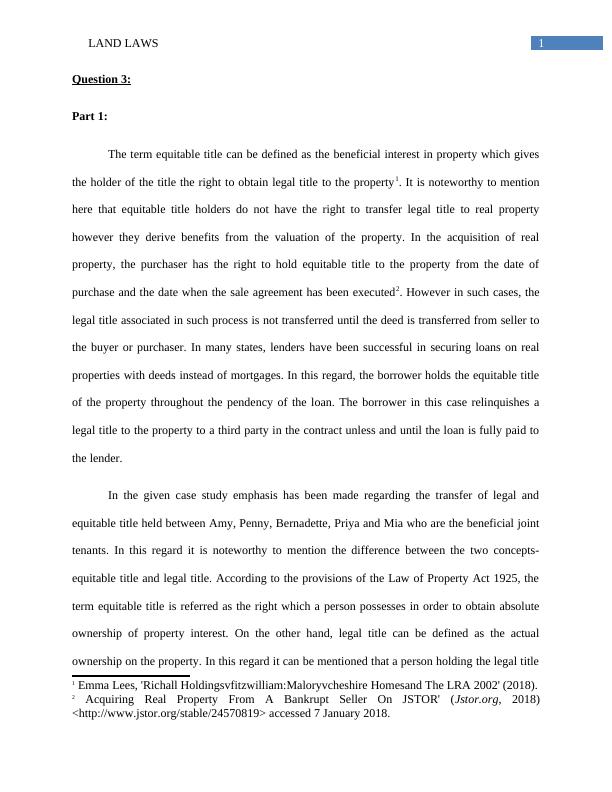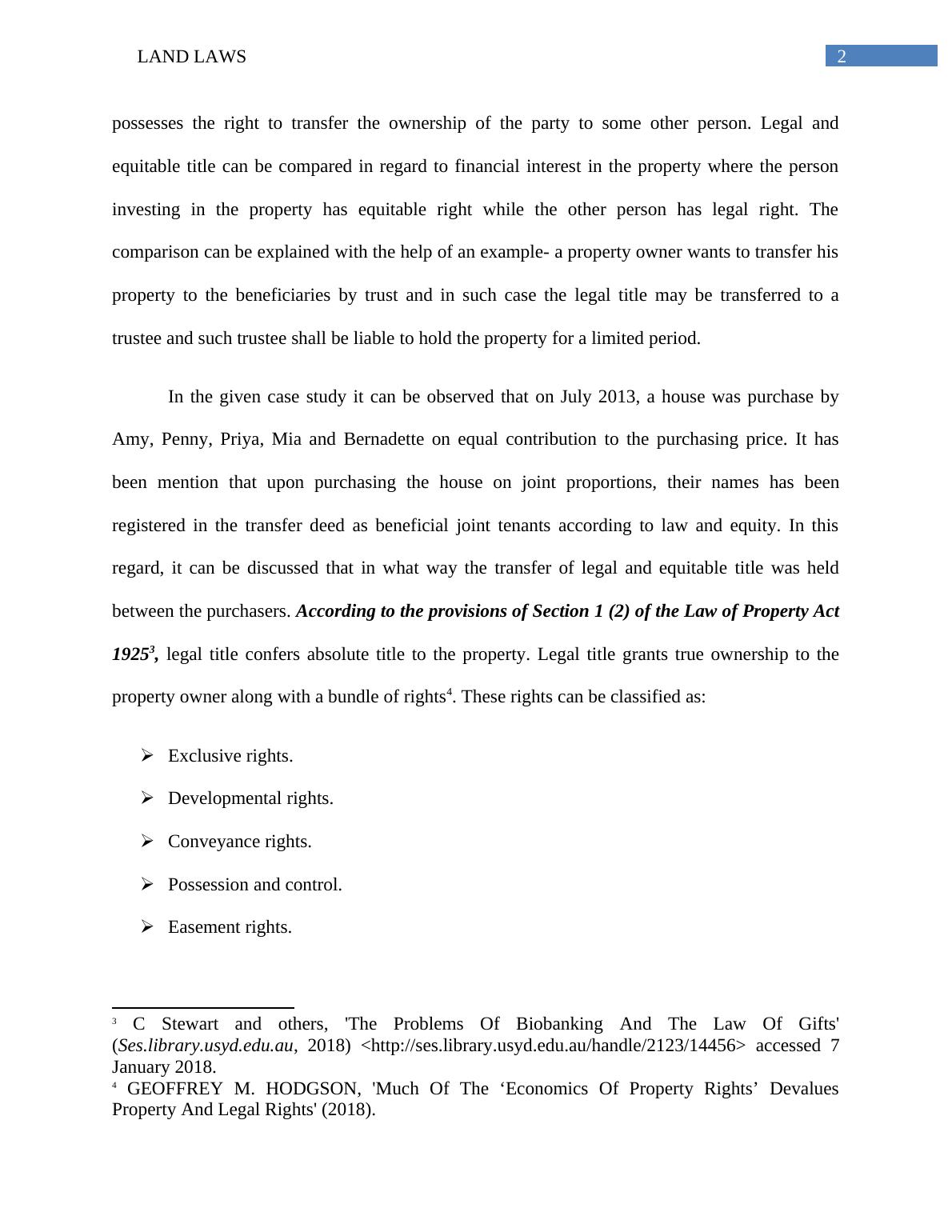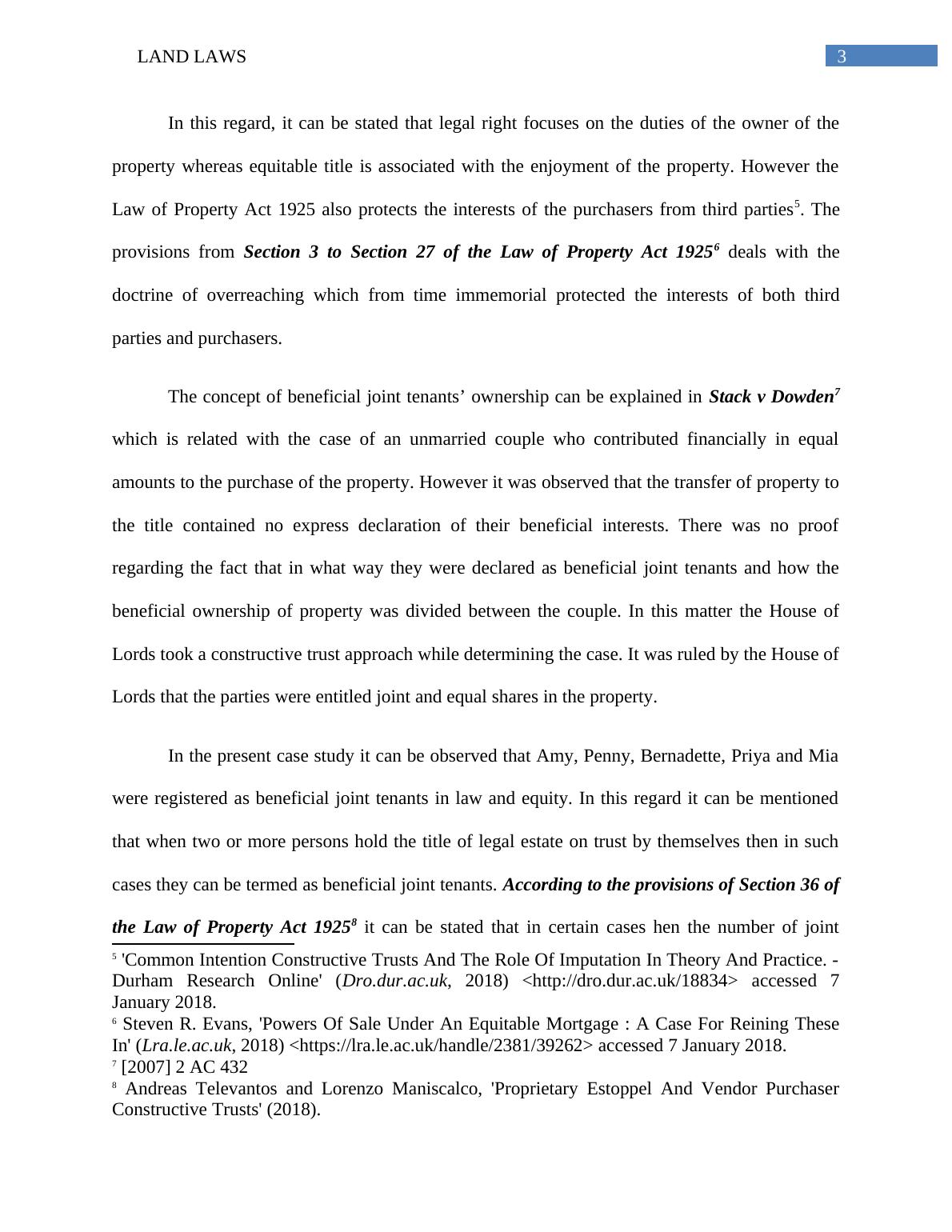Land law Problem Question: Legal Interest in Property
12 Pages2649 Words343 Views
Added on 2020-05-28
Land law Problem Question: Legal Interest in Property
Added on 2020-05-28
ShareRelated Documents
Running head: LAND LAWSLand LawsName of the StudentName of the UniversityAuthor Note

1LAND LAWSQuestion 3:Part 1:The term equitable title can be defined as the beneficial interest in property which givesthe holder of the title the right to obtain legal title to the property1. It is noteworthy to mentionhere that equitable title holders do not have the right to transfer legal title to real propertyhowever they derive benefits from the valuation of the property. In the acquisition of realproperty, the purchaser has the right to hold equitable title to the property from the date ofpurchase and the date when the sale agreement has been executed2. However in such cases, thelegal title associated in such process is not transferred until the deed is transferred from seller tothe buyer or purchaser. In many states, lenders have been successful in securing loans on realproperties with deeds instead of mortgages. In this regard, the borrower holds the equitable titleof the property throughout the pendency of the loan. The borrower in this case relinquishes alegal title to the property to a third party in the contract unless and until the loan is fully paid tothe lender.In the given case study emphasis has been made regarding the transfer of legal andequitable title held between Amy, Penny, Bernadette, Priya and Mia who are the beneficial jointtenants. In this regard it is noteworthy to mention the difference between the two concepts-equitable title and legal title. According to the provisions of the Law of Property Act 1925, theterm equitable title is referred as the right which a person possesses in order to obtain absoluteownership of property interest. On the other hand, legal title can be defined as the actualownership on the property. In this regard it can be mentioned that a person holding the legal title1 Emma Lees, 'Richall Holdingsvfitzwilliam:Maloryvcheshire Homesand The LRA 2002' (2018).2 Acquiring Real Property From A Bankrupt Seller On JSTOR' (Jstor.org, 2018)<http://www.jstor.org/stable/24570819> accessed 7 January 2018.

2LAND LAWSpossesses the right to transfer the ownership of the party to some other person. Legal andequitable title can be compared in regard to financial interest in the property where the personinvesting in the property has equitable right while the other person has legal right. Thecomparison can be explained with the help of an example- a property owner wants to transfer hisproperty to the beneficiaries by trust and in such case the legal title may be transferred to atrustee and such trustee shall be liable to hold the property for a limited period. In the given case study it can be observed that on July 2013, a house was purchase byAmy, Penny, Priya, Mia and Bernadette on equal contribution to the purchasing price. It hasbeen mention that upon purchasing the house on joint proportions, their names has beenregistered in the transfer deed as beneficial joint tenants according to law and equity. In thisregard, it can be discussed that in what way the transfer of legal and equitable title was heldbetween the purchasers. According to the provisions of Section 1 (2) of the Law of Property Act19253, legal title confers absolute title to the property. Legal title grants true ownership to theproperty owner along with a bundle of rights4. These rights can be classified as:Exclusive rights.Developmental rights.Conveyance rights.Possession and control.Easement rights.3 C Stewart and others, 'The Problems Of Biobanking And The Law Of Gifts'(Ses.library.usyd.edu.au, 2018) <http://ses.library.usyd.edu.au/handle/2123/14456> accessed 7January 2018.4 GEOFFREY M. HODGSON, 'Much Of The ‘Economics Of Property Rights’ DevaluesProperty And Legal Rights' (2018).

3LAND LAWSIn this regard, it can be stated that legal right focuses on the duties of the owner of theproperty whereas equitable title is associated with the enjoyment of the property. However theLaw of Property Act 1925 also protects the interests of the purchasers from third parties5. Theprovisions from Section 3 to Section 27 of the Law of Property Act 19256 deals with thedoctrine of overreaching which from time immemorial protected the interests of both thirdparties and purchasers.The concept of beneficial joint tenants’ ownership can be explained in Stack v Dowden7which is related with the case of an unmarried couple who contributed financially in equalamounts to the purchase of the property. However it was observed that the transfer of property tothe title contained no express declaration of their beneficial interests. There was no proofregarding the fact that in what way they were declared as beneficial joint tenants and how thebeneficial ownership of property was divided between the couple. In this matter the House ofLords took a constructive trust approach while determining the case. It was ruled by the House ofLords that the parties were entitled joint and equal shares in the property. In the present case study it can be observed that Amy, Penny, Bernadette, Priya and Miawere registered as beneficial joint tenants in law and equity. In this regard it can be mentionedthat when two or more persons hold the title of legal estate on trust by themselves then in suchcases they can be termed as beneficial joint tenants. According to the provisions of Section 36of the Law of Property Act 19258 it can be stated that in certain cases hen the number of joint5 'Common Intention Constructive Trusts And The Role Of Imputation In Theory And Practice. -Durham Research Online' (Dro.dur.ac.uk, 2018) <http://dro.dur.ac.uk/18834> accessed 7January 2018.6 Steven R. Evans, 'Powers Of Sale Under An Equitable Mortgage : A Case For Reining TheseIn' (Lra.le.ac.uk, 2018) <https://lra.le.ac.uk/handle/2381/39262> accessed 7 January 2018.7 [2007] 2 AC 4328 Andreas Televantos and Lorenzo Maniscalco, 'Proprietary Estoppel And Vendor PurchaserConstructive Trusts' (2018).

End of preview
Want to access all the pages? Upload your documents or become a member.
Related Documents
Creation of Legal and Equitable Mortgages in the UKlg...
|9
|2661
|414
Impact on the Legal Estate and Equitable Interestslg...
|8
|3076
|279
Core Principles of Mortgage and Remedies for Mortgageelg...
|12
|3184
|44
Law of Property Act, 1925lg...
|6
|1299
|75
(Solved) Land Law : Assignmentlg...
|10
|2943
|44
Legal Issues in Property Law: Case of John Daniel Cummins v Cummins HCA 6 [72], 2006lg...
|8
|2678
|386
